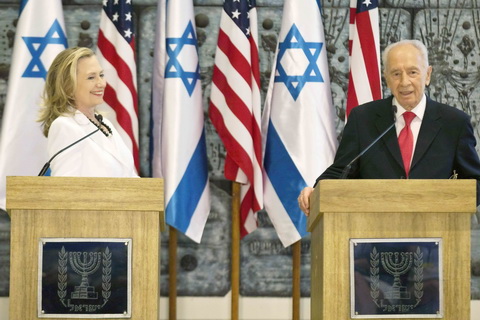Despite Egypt’s peace treaty with Israel, the concept of “normalization is still frowned upon by the majority of politicians and intellectuals. Any collaboration between the two countries, whether on the economic, cultural or touristic level, is always sure to stir up debate.
At the dawn of 2009, Arab foreign ministers and United Nations’ Security Council both held emergency meetings to discuss Israel’s latest atrocious attack on Gaza, Operations Cast Lead, which was launched on Dec. 27. The 23-day Israeli assault on Gaza targeted civilians and claimed the lives of 1,417 Palestinians, left the city in ruins and thousands homeless.
The Israeli conductor
The War on Gaza immediately cast an even darker shadow on normalization with Israel on the cultural scene through calls to cancel an Opera House concert by renowned Israeli conductor Daniel Barenboim who was invited by the Austrian Embassy in Egypt.
The concert was rescheduled for April 16 amid heated discussions, with analysts interpreting Culture Minister Farouk Hosni’s embrace of the maestro as part of his campaign to head the UNESCO.
Barenboim’s concert marks “a change in Hosni’s policy – which opposed normalization with Israel, said Nabil Abdel Fattah, analyst at Al-Ahram Center for Political and Strategic Studies.
In a press statement sent to Daily News Egypt, Hosni said that Barenboim is known for advocating peace in the Arab world, and opposes Israel’s policies towards Palestinians.
While admitting that “Barenboim is a man of peace, and that the concert is key to creating a dialogue between Israeli and Palestinian intellectuals, Abdel Fattah predicted that the change in policy would help Hosni’s campaign to become UNESCO’s secretary general.
The 66-year-old Argentinean-born conductor was criticized by Israeli politicians when he attacked them during a special event held at the Knesset to award Barenboim the prestigious Wolf Prize in 2004. In January 2008, Barenboim was given honorary Palestinian citizenship.
The Ahram visit
On the media and journalism front, Israeli ambassador Shalhom Cohen’s visit to the office of Al-Ahram’s Democracy Review magazine editor-in-chief Hala Moustafa in September triggered controversy within the state-owned foundation.
Cohen had arrived at the Ahram building one afternoon, leaving security officials surprised and flustered since they were not given prior notice and had no instructions on how to act.
“It is an ordinary meeting that was previously scheduled to discuss the ambassador’s proposal to hold lectures at the magazine; it went on for 60 minutes and I admit that the meeting was set without prior permission from Al-Ahram’s management, Moustafa told news reports at the time.
The board of the state-owned foundation referred Mostafa to the legal affairs department to be questioned over inviting the Israeli ambassador to her office after the Journalists’ Syndicate also opened an investigation into the same incident, which is seen as violating the general assembly’s ban on any form of cooperation with Israel.
Al-Ahram’s board issued four decrees following the incident, referring Moustafa to legal affairs, banning any Israeli from entering the organization’s premises, banning any joint studies, meetings and conferences with researchers with Zionist ideas, and distancing Abdel Moneim Saeed’s personal pro-normalization views from his position as chairman of Al-Ahram’s board.
Israeli doctors
On the academic front, the Susan G. Komen for the Cure organization withdrew its invitation to Israeli doctors to attend a conference in Egypt upon the request of Egypt’s Minister of Health.
The conference was organized as part of the American NGO’s breast cancer awareness month activities on Oct. 21-22 in Alexandria, which brought together breast cancer awareness advocates from 10 Middle Eastern countries.
According to the Israeli news portal J Weekly, the Anti-Defamation League’s national director, Abraham Foxman, wrote a letter to the NGO’s President Hala Moddelmog, condemning the decision and describing it as “shocking and contrary to the stated purpose of these programs.
No to Lieberman
Amid these two events influencing Egyptian-Israeli normalization, Egyptian Foreign Minister Ahmed Aboul Gheit threatened to boycott the Union for Mediterranean Foreign Ministers conference, which is scheduled to take place in Istanbul, Turkey, if right-wing Israeli Foreign Minister Avigdor Lieberman attends it.
“Forget it. I will not attend if Lieberman is there, Aboul Gheit said at the time. “I refuse to sit at the same table with him, or even be in the same room as him, he added.
Going to Palestine
Again on the cultural front, actors have condemned a visit to Palestine by actress Hend Sabry which was interpreted as a form of normalization.
“Those who have attacked me do not make any sense. Accusing anyone who visits Palestine of promoting normalization of ties with Israel is utterly senseless. In fact, whoever visits Palestine contributes to the breaking of the blockade imposed on the Palestinians and puts a smile on the faces of its people, Sabry said in response to heavy criticism by some media channels.
“I do invite all Arabs, particularly artists, to visit Palestine because they cannot really appreciate the painful reality on the ground unless they witness it and feel the frustration suffered by the Palestinians, she added.
In a phone-in to terrestrial television talk show “El-Beit Beitak, head of the Egyptian Actors’ Syndicate, Ashraf Zaki, expressed his support for Sabry’s visit and praised her courage; in addition, he stated that “the Egyptian Actors’ Syndicate condemns and disapproves of any form of normalization with Israel.
“Israel is not creating the suitable atmosphere for promoting normalization as they continue their occupation of Palestinian land; they are creating hostility and hatred, explained Abdel Aleem Mohamed, Israeli studies expert at Al-Ahram Center for Political and Strategic Studies.
“Through their aggressive behavior they are not creating an atmosphere of tolerance, he added.


